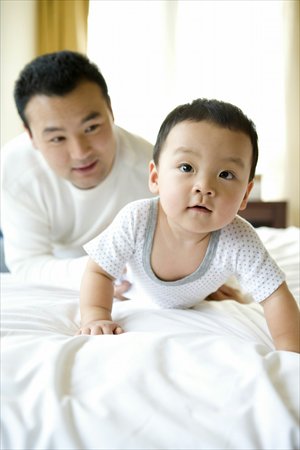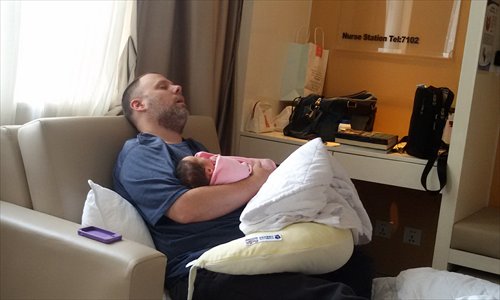HOME >> LIFE
Born different
By Kemengjie Source:Global Times Published: 2015-11-23 22:03:01
A look at the cultural differences around birth in the US and China

Photo: IC

Photo: Courtesy of Kemengjie
As someone who has had kids in both the US and China, I consider myself very fortunate to have been given this opportunity to see the differences and similarities that exists in the two cultures when it comes to giving birth - a common experience shared by all of humanity.An issue of choice
My first son was born in Hawaii. A somewhat scary experience since he was born an entire month premature, the birth itself went rather smoothly... maybe a little too smoothly. I say this because a major decision was made that day, but because things were happening so quickly and routinely, this decision was entirely made for me: whether or not to get my son circumcised.
In the States most men are circumcised at birth. It is seen as such a natural part of the birth process that, at least twenty years ago when I had my first child, neither the doctors nor nurses even asked me if I wanted it done. It simply wasn't a topic of conversation. After my son was born, they weighed him, cleaned him up and then one of the staff grabbed what looked like a scalpel and, zip-zap, my son's little hoodie had become a turtleneck sweater.
Prior to the birth and right up to when they removed my son's foreskin, at no point did any of the doctors or nurses sit down with us to discuss this decision that my son would have to live with for the rest of his life, and to be honest as a young man in his early twenties, I never even considered there might be another option.
It was just the way things were done.
The great thing about traveling abroad is that you get opportunities to expand your world view a bit. Living in another culture you suddenly discover that the world you knew is actually much bigger than you originally thought.
As many who live in Asia may know, circumcision is not widely practiced here. So for the first time, whether to get my son circumcised became a decision I actually had to make for myself instead of having it done for me.
The main idea behind circumcision is that it is supposed to be more sanitary and helps prevent some diseases. So from a medical perspective it naturally sounds like a no-brainer: Who wouldn't get circumcised, right? Yet, living abroad I've noticed that most of the men in the world seem to get by just fine going "au naturel." It really got me thinking as to whether it was really necessary to lop a part of my kids anatomy off for cleanliness, especially in this day and age of ever-present anti-bacterial hand sanitizers.
It certainly wasn't an easy decision. Some considerations went beyond the purely medical: Would I want my son to look different than his dad? Eventually we plan on moving back to the States, wouldn't I be setting him up to be tormented by others in the high school showers?
After discussing things with my Brazilian wife - who being from a place where uncut men are the norm had never even thought about the question - we finally decided to go the all natural route. Sure I may regret this decision somewhere down the line (or rather he may regret my decision), in the end I'm just glad that I was given the decision in the first place.
Handle with care
One of the major differences that I noticed here in China was the way they treated my wife after the birth. It was as if having a child had suddenly turned her into a glass figurine. The staff, our Chinese friends and everyone around us treated her as if she was the most fragile thing in the world after her caesarian.
Of Chinese descent, my wife was very familiar with this attitude. Traditionally speaking, women who give birth in China go through a month long period of recovery called yuezi. During this time, new mothers are supposed to spend practically all their time in bed, anything cold is off limits and they must drink Chinese medicine and specially prepared meals to help "replace" lost nutrients.
My wife actually spent a month in one of these yuezi centers in Taiwan after she gave birth to her daughters from a previous marriage. She absolutely loved it because she was so tired after her cesareans and the nurses there took care of everything from changing diapers to giving the new baby a bath. According to her it took her nearly three weeks before she could get out of bed comfortably on her own.
We originally looked into a yuezi center here in the Chinese mainland, but the prices were far out of reach of anything we could afford. Hearing how long it took her to get back on her feet before, I was fully prepared to have to wait hand and foot on my wife for the entire month after our son was born.
Yet that turned out not to be the case.
Although the staff at the hospital was constantly encouraging my wife to take it easy, the Western doctor that performed her cesarean was having none of that. When she would come visit for post-operation check ups she always encouraged my wife to get up and start walking, explaining that this would actually help her with her recovery. With this encouragement and probably because I was a lousy caretaker, over the following week after her surgery she was often on the move around our apartment. By the second day she could manage the few steps to the bathroom, by the third day she could go for a walk down the hallways and by the end of the week, although she wasn't ready to go out dancing, she was moving about the house almost as if she hadn't had surgery at all.
No pain, no gain
This is also where another interesting difference in attitudes came into play. One that I find really strange considering the Chinese staff's constant tip-toeing around my wife. After having another living being ripped right from her belly, my wife was understandably in quite a lot of pain after her surgery.
Yet when she would ask the nurses for pain killers all they were willing to give her was ibuprofen. Later after a conversation with our doctor during which my wife mentioned that none of the painkillers she was on seemed to be working, the doctor told us that we would have to DEMAND they give her Percocet before they would be willing. It seems that the fear was that such a strong pain medication as Percocet would be bad for our breast-feeding baby, a fear the doctor assured us was unfounded so long as she didn't take a pill more often than every eight hours. I found this unwillingness to give medication that could help my wife manage her pain better a bit perplexing at first considering how the staff were constantly going on about how delicate a new mother's health was all the time. Yet I guess in the staff's minds, any possible threat to the baby out trumped concerns for my wife's comfort. Children often are, after all, No.1 in China.
Posted in: Miscellany